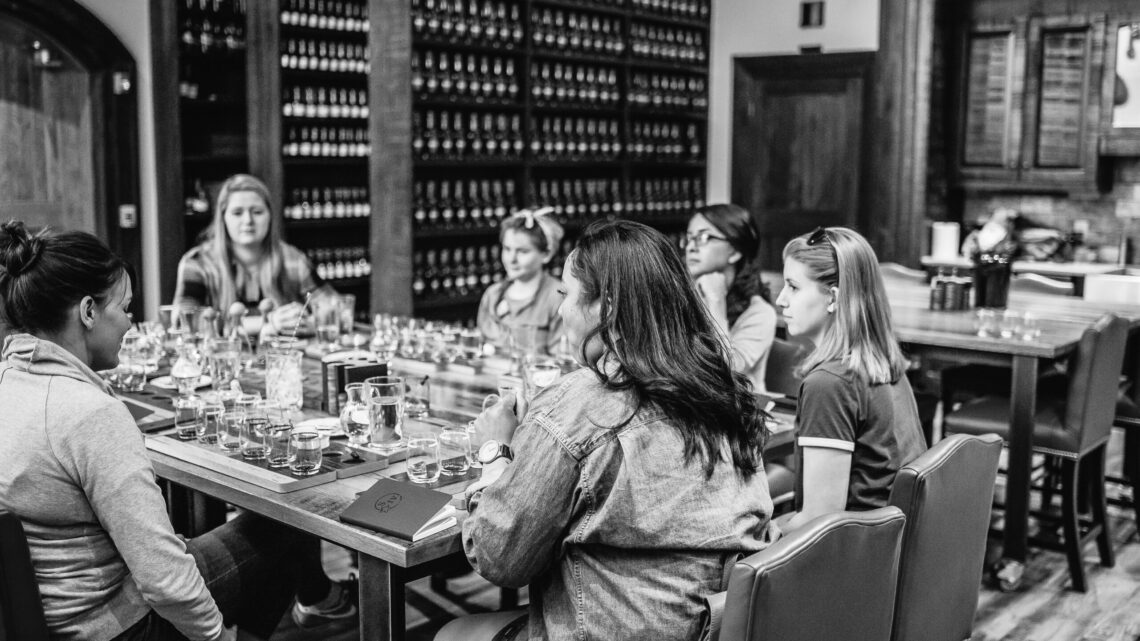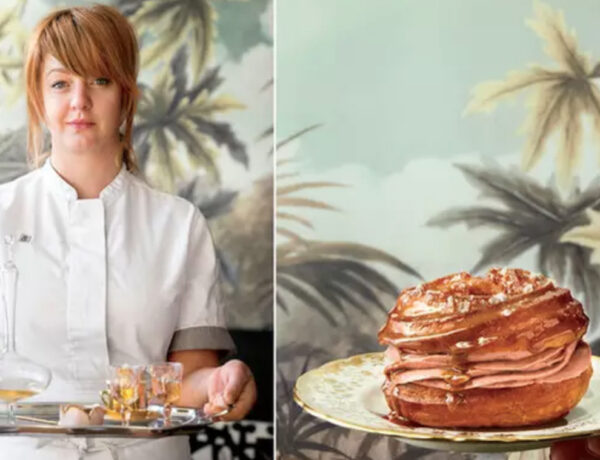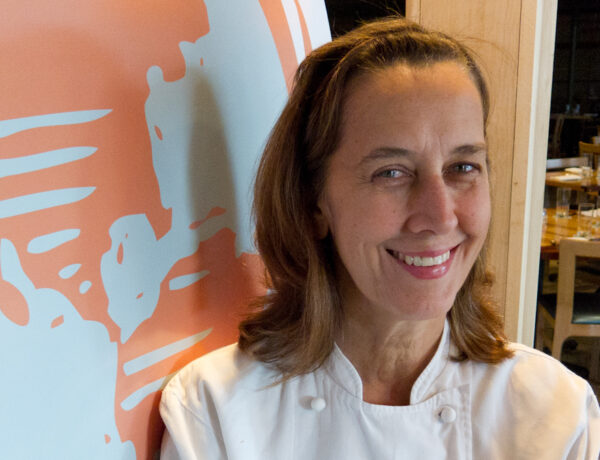UPDATE 3.16.20: The LEE Initiative announced its next class of mentees. Meet these inspiring chefs ready to take on and take over the culinary scene.
Before Lindsey Ofcacek co-founded The LEE (Let’s Empower Employment) Initiative and built out a non-profit support program dedicated to increasing diversity in culinary leadership, she wore a ton of different hats in the restaurant industry. Throughout her 20+ year career, she’s worked in the front and back of the house as a server, bartender, line cook, events coordinator and general manager. She even did a stint as an intern for a permaculture farm in Indiana. She’s now the wine director for 610 Magnolia and managing director of The LEE Initiative.
In the wake of the #MeToo movement, Lindsey and her business partner, Chef Edward Lee, knew it was time to level the playing field for women working in hospitality. In this interview, Lindsey digs into her experience as a working mother in foodservice and why she believes mentorship and providing early-career opportunities to women is so critical to the growth and success of the industry.
What’s the biggest challenge you’ve faced in your career and what do you feel is your greatest success?
My greatest challenge has been trying to achieve and maintain work/family life balance. No one in this industry is a stranger to the long and often late hours. When I found out I was expecting my first child, I was the front of house manager and events coordinator at Decca Restaurant in Louisville, KY. To be honest, I immediately started planning my exit strategy from the industry. I didn’t know a lot of mothers that held this position and I couldn’t begin to figure out how to make it all work. I approached the Chef/Owner Annie Pettry to essentially put in my resignation. To my surprise, I was met with nothing but support. It wasn’t easy, but together we worked out a plan that worked for both me and the restaurant. I was given modified hours and an assistant manager was hired to be trained to perform my job during my paid maternity leave, which was nearly six months. I was allowed to take as much or as little time as needed and welcome to come back with modified hours as I felt comfortable. I was supported by all sides of management and staff and accommodated as a nursing mother over the next two years. Then—surprise-—child number two was on the way. I again was granted the same accommodations.
Even after leaving Decca and signing on to be the general manager and wine director for Chef Edward Lee, I was again met with a restaurateur who never batted an eye at making accommodations for me as a working mother. I realized that it’s not that this industry cannot be accommodating to families, you just have to find the right companies and owners. So you could say that my biggest challenge and biggest successes stem from the same thing, finding work-family/life balance within a historically difficult industry.

What inspired you to start the LEE Initiative?
In the wake of the #MeToo movement hitting our industry and a lot of really unsettling working conditions that women were facing in restaurants being brought to light, we as a company started to look inward. Dialogue and conversations about what was happening in some of the most iconic restaurant companies in America were being had amongst Chef Lee, our management teams and staff. This is an industry that we are raising our families in, one that we believe at its core is about hospitality, community and support. The picture that was being painted was not a reality in our restaurant group.
This is an industry that we are raising our families in, one that we believe at its core is about hospitality, community and support.
While most of us witnessed our fair share of poorly run establishments and unacceptable behavior, none of us had chosen to stay in those environments and we certainly were not running our business that way. We also knew a lot of other restaurateurs who were shining examples of fair practices and policies. From my perspective, one common thread in those companies was women in leadership.
We knew that the time to sit and watch was over. It was time to act and do something positive for our community. After throwing around a multitude of ideas, we landed on mentorship. To us, mentorship and pairing chefs in the infancy of their career with successful women who owned companies and could help them pave their own path to leadership was how we could have the most impact in our community and industry as a whole. We wanted to give rise to women by providing externships and trainings, the opportunity to attend continuing education symposiums, and the ability to network with other women who had also travelled this path and could offer advice as someone who had already been there.
We also wanted to level the playing field a bit and offer some opportunities that are not typical early in your career. Our chefs get to make their own signature bourbon with Maker’s Mark the first month in the program. They host their own dinner with their food at The James Beard House every fall. We are so grateful for those partnerships that allow us to have the mentees do all of that. In reality, our mentees have the opportunity to do more in six months than a lot of chefs do in five years.
We do this because it’s time to level the playing field.
Why do think it’s so important for programs like this to exist, right now?
Everyone benefits from more diverse and equitable workplaces. The restaurant industry is having this incredible boom right now. Being a chef or cook has not always been held in such high esteem. If we want to continue to grow and thrive, we must invest in the future leaders in culinary. People like to give millennials and gen Z a bad rap, I personally find them to be incredible. These generations don’t just seek work life balance and equality, they demand it. They are the future of this industry and if we do not continue to fight for better practices, we will lose valuable leaders and assets to our workforce.

In a sea of applicants, what do you look for when selecting your mentees for the season?
Reading the applications from hopeful mentees every February is my favorite thing to do. It’s an incredible reminder of how many talented chefs there are in our region. They are all qualified in their culinary skills. What we look for in addition to culinary skills is activism. We want to work with chefs who share our vision for a better future. Chefs who will be future leaders and run their companies with fairness, who also want to invest in future generations. Most cooks work long and late hours. If you list a multitude of service and volunteer work in addition to your regular hours, chances are you’re the kind of person we want. So far, this has been true for our mentees. Something that has been incredible to watch—and frankly caught us off guard—is how the mentees never really leave the program. The support network just keeps getting bigger. The second class didn’t cook one event without the first class coming out to volunteer and work alongside them. They washed dishes, they offered advice, sometimes it was just to say “You’ve got this.”
😭😭😭 Wow, what an awesome example of women supporting women!
What are your hopes for the future of this program? Do you have plans to roll it out nationally?
While this initiative is small, it’s that way by design. We wanted to invest directly in our immediate culinary community. We want to have the ability to personally support the mentees in every way. That’s difficult to do if you grow too quickly. We have already expanded our reach beyond Kentucky, to Cincinnati and Southern Indiana. We feel good about the small growth.
This program is also designed to be easy to replicate and we encourage chefs to do so in their own community. We will help them along the way. In fact, we are replicating this program with Chef Kelly English and the 275 Food Project this fall to serve the Memphis, Tennessee area. We will spend the first year helping them get the program off the ground and running. From there, they will continue to grow the program in their community.
As an initiative, we firmly believe that change does not happen in one sweeping motion, but through a collection of small acts and programs like this one.
We are approaching having 15 mentees that have gone through our program and can already see an impact on our culinary scene. Can you imagine what impact we will see in 5 years?

It’s going to be amazing! This is a nice segue into our next question: how do you hope the LEE Initiative will affect the foodservice industry at large?
We are simply trying to level the playing field and ensure that every woman in this industry has the same opportunities and support system that men do. This is not a “Boy’s Club.” The title “Chef” is a gender neutral title. Every person deserves to feel safe, heard, and afforded the same opportunities for advancement in their chosen field.
What advice would you give to women just getting started in this industry or who are facing challenges? Are there resources – podcasts, conferences, online forums, books, etc. – you can recommend?
My number one piece of advice for women just getting started in this industry is find a mentor, build your community, find a place where you are appreciated and encouraged to learn.
If you work for someone who doesn’t value you, move on. You are wasting your time and talents.
For every bad chef, there is an army of good ones waiting for you. Every restaurant needs good staff!
There are a lot of scholarship opportunities available for women. Do your research and continue your education. This is Fab in Charleston is a 48-hour immersive education in hospitality-related topics taught for women by women. They offer scholarships every year. I met more incredible women and learned more about finances and negotiating in those 48 hours than I did the first 15 years in my career.
Listen to other women’s stories; this is the age of the podcast. Two of my favorites are Copper & Heat and Opening Soon, from the folks at TilitNYC. If you like what you hear, reach out to them! I have found that people in this industry are open, supportive and eager to help foster growth in the next generation.
In addition to your work with Chef Lee, are there any peers that you particularly admire for having created positive change for women working in food?
Obviously Chef Lee is a big one. He chose not to be neutral on gender issues in the hospitality world. He continues to dedicate countless hours and resources to balancing the scales in the hospitality industry. His dedication to fighting for equality is a testament to how much this industry means to him. His passion inspires me daily. Dedication to the program is woven into their family. Dianne Lee is the president of our board and we wouldn’t be here without her dedication to the program. Dianne comes from a corporate background and has a different lens. I am so grateful for the time she spends dotting all the i’s and crossing all the t’s to make this program work.
I also have so much admiration for our mentors: Chef Ashley Christensen, Chef Mindy Segal, Chef Katie Button, Chef Nina Compton, Chef Brooke Williamson, Chef Annie Quatrano, Chef Jenn Louis. These chefs, cookbook authors, James Beard Award winners and are running some of the most successful restaurant companies in America. They all offered to share their time and expertise with an unknown chef in Kentucky without hesitation. They give me faith that the restaurant industry we all want is not out of reach.
You’ve worked the gamut in the hospitality and food industries – do you have any interview/career advice on how to break into the industry? I.e., how to present yourself, what skills you should tout, how to have the uncomfortable conversations about salary/benefits to set job expectations ahead of time.
Again, FIND A MENTOR and build a support network. Do not be afraid to use your voice, and speak up. Never be afraid to ask for what you want, the worst that can happen is someone will say no. Know your worth and when to walk away, you do not have to stay in a toxic environment.
I think it’s important to talk about salaries, not only with your employer, but your peers. We are not going to close the gender wage gap if we aren’t talking about it. You never know, your male counterpart earning 20% more than you may be your biggest ally when you fight to change it.






No Comments